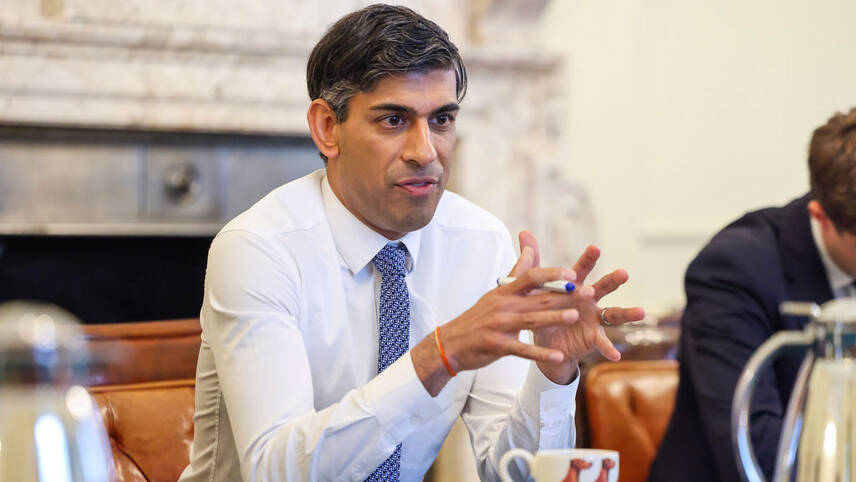Register for free and continue reading
Join our growing army of changemakers and get unlimited access to our premium content

Image: 10 Downing Street. CC BY-NC-ND 2.0. https://www.flickr.com/photos/number10gov/53068264076/
Attending the first day of the World Leaders Summit at COP, the Prime Minister unveiled a new package of dedicated finance aimed at halting nature loss and responding to the climate crisis.
The figures are headline-grabbing – with more than £1.6bn being stated by Government press releases. Additionally, Sunak believes that the UK will exceed its commitment of providing £11.6bn in international climate aid over the next five years up to 2026.
Overall, the UK Government will commit £1.6bn to international climate finance (ICF) projects over the course of COP28, delivering on a pledge made back in September 2023, when the Government promised to deliver the UK’s largest financial contribution to international climate finance, with more than £1.6bn to be ringfenced for developing nations.
Additionally, the Prime Minister announced that a new investment partnership between RWE and Abu Dhabi’s energy company Masdar had been agreed. The new partnership will see around £11bn invested into the Dogger Bank, the world’s largest offshore windfarm, off the coast of Yorkshire.
Dogger Bank is being developed in three phases, each of 1.2GW. Once completed, the project will be the largest of its kind in the world. Completion of the final phase is expected in 2026. It first started generating power for the UK grid in October 2023.
“This is a huge boost to UK renewables, creating more jobs, helping to power three million homes and increasing our energy security,” Sunak said. “
The Government has confirmed that today’s announcement is built on the £1.6bn already earmarked for spending up to 2026, so it’s not a new funding stream. However, almost £900m, including £465m for forests, is new and separate from the other funding.
The new funding will see £500m funnelled into the “Investment in Forests and Sustainable Land Use” programme which works with the private sector to tackle causes of deforestation. The Government expects the programme to mobilise £2bn in private sector investment, supporting farmers and rural communities across 10m hectares of forests globally.
A further £30m will be used to support the REDD Early Movers programme, which provides results-based payments to key forest countries to reduce deforestation and reinvest the money into indigenous and local communities.
The UK has also committed £316m for clean energy projects globally, including up to £185m from the Ayrton Fund for a planned UK-led Climate Innovation Pull Facility to support green technologies in African, Asian, South Asian and Indo-Pacific markets.
British International Investment – the UK’s development finance institution – will invest £44m on various cleantech and climate projects across Africa and Asia.
The UK was also one of the first nations that committed to pay into a new loss and damage fund set up at COP28 on Thursday (30 November).
The UAE has also committed $100m to the fund, a figure that has been matched by Germany. The US has committed $17m – a move that has been criticised for not being sufficient enough – and Japan $10m.
‘Smoke and mirrors’
The £1.62bn financial package was earmarked as part of the Green Climate Fund (GCF), which was established at COP15 as a global fund to help developing countries reduce emissions and adapt to the climate crisis.
Prior to the original £1.6bn announcement it had been widely reported that Sunak was preparing to either scale back or axe the UK’s £11.6bn commitment to annual foreign spending on climate finance. His argument was that the public would not support money being spent this way amid the current economic downturn.
While the new funding is welcome, some green groups have accused the Prime Minister of “smoke and mirrors” tactics by outlining previously agreed commitments.
ActionAid UK’s senior climate and resilience advisor Zahra Hdidou said: “Today Rishi Sunak announced a bold new ‘era of action’ on climate as he ushers in billions of pounds of funding that is neither new nor additional, but a reheated pledge from years gone by. And in setting out an ambition to turbocharge private sector involvement in climate action, the Prime Minister is once again raiding the already depleted ODA budget to subsidise its ideological objectives.
“While of course we welcome the UK’s £316m in funding towards renewables for countries in the Global South, the UK’s domestic policies in opening a hundred new oil and gas licenses completely undermine this commitment and directly harms women and girls on the frontline of climate disasters across the world. Today’s announcement by the Prime Minister is pure smoke and mirrors – a cynical accounting trick to grab headlines while refusing to act meaningfully on climate action.”
Prior to COP28, the Government rolled back a host of key green policy frameworks in a bid to create a “pragmatic” approach to the net-zero transition. These included a five-year delay on the ban of new petrol and diesel cars and vans, to 2035; a weakening of requirements for all homes with oil and gas boilers to replace them with low-carbon alternatives and weakened requirements for landlords
The commitment was first made by the UK at COP26. It forms part of a collective commitment from wealthy nations to $100bn of annual climate finance to the Global South. This $100bn commitment was ratified in 2015 but is yet to be delivered in full.


Unfortunately, the topic of climate change was completely ridden by non-controversial people and their actions are very similar to extinguishing pazhar with gasoline. None of the leaders considered a scientific approach and engaging leading scientific institutions to address climate change. Political slogans are put forward as a solution to the problem, the tasks set are completely forgotten by short-sighted experts. New technical solutions are needed and this, unfortunately, is not accepted by the heads of state who signed the Paris Agreement.